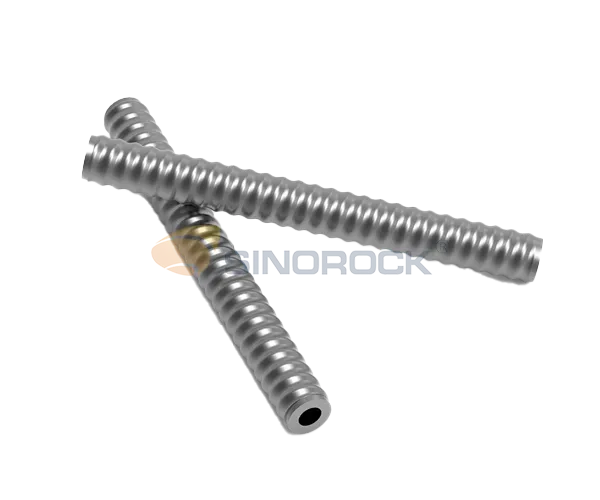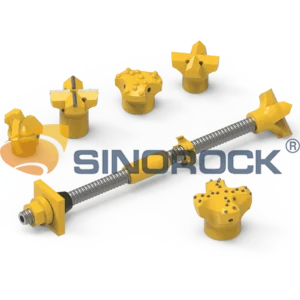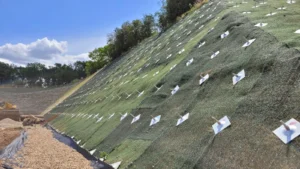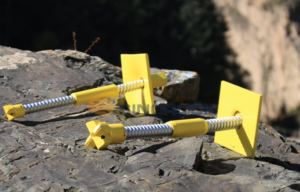Introduction
The foundation is the backbone of any construction project, determining the stability, safety, and longevity of the structure. When constructing on soft ground, however, the challenge becomes even more pronounced. Soft ground, characterized by its loose soil and inadequate bearing capacity, can pose significant risks to the integrity of structures. Fortunately, modern engineering has introduced innovative solutions, among which self-drilling anchor bolts stand out as a highly effective method for stabilizing soft ground.
In this article, we will explore the principles of soft ground stabilization, the working mechanisms of self-drilling anchor bolts, and their numerous advantages in construction projects. We will also highlight Sinorock, a leading manufacturer in this field, and their role in advancing this technology.
Part 1: Principles of Soft Ground Stabilization
Understanding Soft Ground and Its Challenges
Soft ground refers to soil that lacks sufficient strength to support heavy structures or resist deformation. It is commonly found in areas with clay, silt, or loose sandy soils. Construction in such areas requires stabilization techniques to ensure the foundation can bear the necessary load without excessive settlement or collapse.
Soil instability can lead to significant issues, such as:
- Excessive settlement: The ground sinks under the load, leading to structural damage.
- Deformation: The ground may shift unevenly, causing cracks or instability in the structure.
- Water retention: Poor drainage in soft ground may exacerbate the problem by increasing water content.
To overcome these challenges, soft ground stabilization techniques are employed to improve the soil’s physical properties and enhance its load-bearing capacity.
Key Objectives of Soft Ground Stabilization
The primary goal of soft ground stabilization is to enhance soil strength and stability. The process typically involves the following objectives:
- Compaction: Increasing the density of loose soil to prevent excessive movement.
- Water content regulation: Reducing the water content in the soil to lower its plasticity and improve its strength.
- Reinforcement: Introducing materials such as geotextiles or anchors to provide additional strength and prevent deformation.
Self-drilling anchor bolts play a critical role in reinforcing soft ground, offering a comprehensive and efficient solution for ground stabilization.
Part 2: Principles of Self-Drilling Anchor Bolt Construction
What are Self-Drilling Anchor Bolts?
Self-drilling anchor bolts are a groundbreaking solution in geotechnical engineering designed to stabilize and reinforce soft ground. Unlike traditional methods, which require separate drilling, grouting, and anchoring processes, self-drilling anchor bolts combine these steps into a single integrated operation. This approach makes the process faster, more efficient, and cost-effective.

How Self-Drilling Anchor Bolts Work
The construction process for self-drilling anchor bolts involves the following steps:
- Simultaneous Drilling and Grouting:
A hollow anchor bolt is drilled into the soft ground. During this process, grout is pumped through the hollow center of the bolt. The grout permeates the surrounding soil, bonding the bolt to the ground and increasing its stability. This simultaneous drilling and grouting process accelerates the installation and enhances the anchoring effect. - Anchoring for Ground Stability:
As the anchor bolt is inserted, it forms a mechanical connection between the bolt and the soil. This anchoring effect prevents ground movement and helps resist external forces acting on the soil, such as weight from construction or shifting due to weather conditions. - Inhibiting Ground Deformation:
The grout not only bonds the bolt to the surrounding soil but also acts as a stabilizing force that inhibits excessive deformation. This is crucial in soft ground conditions, where ground movement can lead to structural damage. The comprehensive anchoring system ensures that the soil retains its form, preventing collapse or instability.
Part 3: Advantages of Using Self-Drilling Anchor Bolts in Soft Ground Stabilization
1. Speed and Efficiency
One of the standout advantages of self-drilling anchor bolts is the speed at which the stabilization process can be completed. Traditional methods typically involve separate drilling, grouting, and anchoring stages, each requiring different equipment and time. In contrast, self-drilling anchor bolts combine these steps, reducing the overall construction timeline.
This efficiency not only accelerates the stabilization process but also allows for faster project completion, leading to reduced downtime and increased productivity.
2. Cost-Effectiveness
The integrated approach of self-drilling anchor bolts significantly reduces both direct and indirect costs. By combining the drilling, grouting, and anchoring operations into a single process, there is a reduction in labor costs, equipment usage, and material waste. This results in a lower overall project cost compared to traditional stabilization techniques.
Additionally, the faster implementation of self-drilling anchor bolts can lead to reduced financing costs and quicker project turnover.
3. Enhanced Safety Measures
Safety is paramount in construction, particularly when dealing with soft ground that is prone to movement. Self-drilling anchor bolts provide an effective solution to mitigate risks associated with ground instability. The enhanced bonding and anchoring system prevent ground collapse and reduce the likelihood of shifting, ensuring both the construction site and the surrounding areas remain safe.
The reduction in soil movement also minimizes the risk of structural damage during and after construction, making self-drilling anchor bolts a critical safety feature in soft ground stabilization.
4. Versatility in Application
Self-drilling anchor bolts offer unparalleled versatility across various construction applications. These anchor bolts are commonly used in:
- Tunneling: To stabilize tunnel walls and prevent collapses in soft ground conditions.
- Slope stabilization: To reinforce slopes and prevent landslides in areas with loose soil.
- Foundation reinforcement: To support building foundations in soft or unstable soil.
Their ability to adapt to different project types and geological conditions makes self-drilling anchor bolts a versatile and reliable choice for engineers.
5. Environmental and Sustainability Benefits
Beyond their performance advantages, self-drilling anchor bolts also contribute to environmental sustainability. The efficiency of the installation process reduces energy consumption and minimizes the environmental footprint. Moreover, the durable nature of self-drilling anchor bolts ensures that fewer resources are needed for maintenance or replacement over time, contributing to long-term sustainability.
Part 4: Sinorock – A Leading Manufacturer in Self-Drilling Anchor Bolts
Sinorock’s Expertise in Self-Drilling Anchor Bolts
Sinorock is a trusted leader in the geotechnical industry, providing high-quality self-drilling anchor bolts designed for enhanced performance and reliability. With years of experience in manufacturing and supplying geotechnical solutions, Sinorock has established a reputation for excellence.
Sinorock’s self-drilling anchor bolts are engineered for maximum durability and effectiveness. They are used in various applications, from tunneling to foundation reinforcement, and have proven to deliver superior results in soft ground stabilization projects.
Conclusion
The stabilization of soft ground is a critical step in ensuring the safety and durability of construction projects. Self-drilling anchor bolts offer an efficient, cost-effective, and versatile solution to reinforce soft ground and prevent issues such as excessive settlement and deformation. With their ability to speed up the construction process and enhance safety, self-drilling anchor bolts have become the go-to choice for soft ground stabilization.
As the construction industry continues to evolve, the role of innovative solutions like self-drilling anchor bolts becomes increasingly important. Companies like Sinorock continue to lead the charge in manufacturing high-quality anchor bolts, contributing to the advancement of construction technologies and the successful completion of projects worldwide.
For anyone involved in soft ground stabilization, adopting self-drilling anchor bolts is a step toward ensuring long-term stability, safety, and cost savings.





